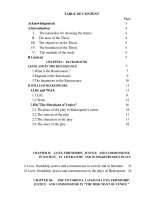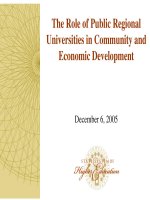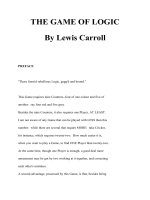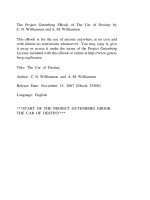The Romance Of Antar By Anonymous, Terrick Hamilton, W. A. Clouston doc
Bạn đang xem bản rút gọn của tài liệu. Xem và tải ngay bản đầy đủ của tài liệu tại đây (653.17 KB, 159 trang )
The Romance of Antar
Anonymous
Translated by Terrick Hamilton
Edited by W. A. Clouston
THE
ROMANCE OF ANTAR:
AN EPITOME
OF
THE FIRST PART, TRANSLATED BY
TERRICK HAMILTON, ESQ.,
WITH SELECTIONS FROM THE POETRY.
BY THE EDITOR.
I have only seen the fourteenth volume of this work, which comprises all
that is elegant and noble in composition. So lofty, so various, and so bold is
its style, that I do not hesitate to rank it amongst the most finished
poems.—Sir W. Jones.
This is the work, and not, as is generally supposed, the “Thousand and One
Nights,“ which is the source of the stories that fill the tents and cottages of
Arabia and Egypt.—Von Hammer.
THE
ROMANCE OF ANTAR.
EDITOR‘S PREFACE.
IT is generally believed that this celebrated Arabian Romance was
composed, in the eighth century, from traditionary tales which had
been long current in the East, by El-Asma‘ee, a famous philologist
and poet at the court of Hároon Er-Rasheed. Other authors and
sources (for instance, Johainah and Abu Obeidah) are mentioned in
the work, but these, according to Von Hammer, have been inserted
by story-tellers in the coffeehouses. Lane, in his admirable work on
the Modern Egyptians, remarks that the ‘Ulamà (learned men) “in
general despise the romance, and ridicule the assertion that El-
Asma‘ee was its author“: their opinion, however, on a question of
this kind, is of little value.
The complete work is usually bound up in forty-five volumes of
various sizes—presenting a mass sufficient to appal the most
indefatigable of translators; not to speak of the impossibility of
finding European readers who would wade through the translation,
if published. An abridged copy of this voluminous work, done by
some learned Syrians (and hence called the Shamiyeh, or Syrian
Antar, to distinguish it from the original, which was known as the
Hijaziyeh, or Arabian Antar), having been obtained by Mr Terrick
Hamilton, during his residence at Constantinople, in his capacity of
Oriental Secretary to the British Embassy there, he was induced by
its comparative brevity to undertake the task of translating it into
English.
In the year 1819 the first fruits of his labours in this direction
appeared at London in the form of a small octavo volume of about
300 pages, entitled, “Antar, a Bedoueen Romance, translated from
the Arabic,“ &c., with a short introduction by a friend who had seen
the volume through the press. Next year (1820) three more volumes
were issued, completing the first of the three parts into which Mr
Hamilton intended dividing his translation, and bringing down
Antar‘s adventures to his marriage with Abla.
The work was very favourably noticed by the leading reviewers of
the day, some of whom ventured to predict for it a popularity in this
country as great as that accorded to the fascinating “Thousand and
One Nights.“ The anticipations of the translator, and of his friendly
critics, were, however, not realised: the marvellous exploits of the
Absian hero, and the wild and fiery, the tender and beautiful,
effusions of natural poetry with which the narrative is interspersed,
had little interest or charm for the bulk of English readers,—familiar
only with absurd imitations of Eastern fiction, adapted from the
French, and bearing as little resemblance to Oriental story as the
stage sailor of transpontine melodrama bears to the seaman of real
life,—and, as a consequence, the translation of Antar was not
completed; but Mr Hamilton gives an outline of the contents of the
remainder, as follows:—
“The Second Part includes the period when the hero suspends his
Poem at Mecca. This grand point he at length attains, not only by the
friendly dispositions of his former associates, and the continuance of
his own heroic deeds, but also by the means of his two sons and a
brother, whom he discovers amongst the heroes of the desert.
Encouraged by their counsels, and urged by his own ambition, after
various conflicts and conquests, he resolves to crush the envious
malice of his domestic foes, and in despite of all the machinations
contrived against him, and the hostilities of all the most potent kings
of Arabia, he succeeds in accomplishing this second object of his
ambition.
“The Third Part comprises the death of Antar, and most of his
comrades and relations; in the course of which he wages endless
wars against the more distant tribes,—visits Constantinople and
Europe, and invades that part of Arabia inhabited by the Ethiopians,
amongst whom he discovers his mother‘s relations, and finds out
that she was the daughter of a mighty monarch, and himself thus
descended in both lines from a majestic race. His last conquest is
over his domestic enemies. His death is consonant with the rules of
poetical justice. He falls under the hand of one whom he might have
justly punished with death, but who was the object of cruelty he had
never practised on any one before, not even his most inveterate
foes.“
This singular work is the only record of the every-day life of the
Arabs ere yet they had come under the influence of El-Islám. “Even
in a translation,“ says a judicious critic, “Antar must be perused with
pleasure by those to whom the simple modes of life afford matter of
interesting speculation, and by those who are gratified with flowing
and luxuriant descriptions, united to lively and picturesque sketches
of events and characters.“ Here the virtues and the vices of these
Children of the Desert are faithfully portrayed: hospitable, brave,
vindictive; at once liberal and avaricious; withal possessing a
punctilious sense of honour: such were the pre-Islamite Arabs,
whom the pen of El-Asma‘ee has so vividly delineated. The Poetry
with which the work is richly jewelled is the poetry of nature,
abounding in touches of pathos, far beyond the reach of art.
I regret that I have been unable to obtain any German or French
translation of the account of Antar‘s suspending his Kasidah on the
Kaaba; but my friend Mr. E. J. W. Gibb, of Lochwood, Lanarkshire, a
young Orientalist of much promise, has favoured me with a
translation of the Death of Antar—one of the noblest of heroic
poems—from the French version of M. Caussin de Perceval, which is
appended to the following rough sketch of the leading incidents in
the First Part, according to Mr Hamilton‘s translation.
______________
T
HE adventures of Antar naturally suggest the question of the origin
of romantic fiction, or chivalric romance, in Europe, which has long
been, and perhaps is still, the subject of dispute among men of
learning. By some, romantic fiction is held to be of purely Gothic
origin, brought from the North by the Scalds who accompanied the
army of Rollo into France; others, again, allege that its introduction
into Europe is traceable to the Saracens who settled in Spain early in
the 8th century. The truth seems to be that European mediæval
romances were composed, in unequal parts, of classical tales of
antiquity, Northern legends, and Oriental fictions.
It is far from improbable that the famous Arabian Romance of Antar
furnished the model for the earliest of the regular romances of
chivalry which were current in Europe during the middle ages;
indeed a comparison of incidents in the work of El-Asma‘ee with
others found in the so-called Gothic romances will show some very
striking parallels, sufficient of themselves to lead to this conclusion.
Many of the tales and fictions which were popular in Europe in
mediæval times, and which, collected from oral tradition, have been
preserved in such works as the “Clericali Disciplina“ of Petrus
Alphonsus, and the “Gesta Romanorum,“ have been traced to
Eastern sources—to Arabia and Syria, and thence to India, through
Persia. These fictions probably came into Europe, partly through the
Saracens of Spain, partly through intercourse with the East during
the Crusades.
But in the 8th, 9th, and 10th centuries there was free intercourse
between the Eastern and Western countries of the Roman world.
Hároon Er-Rasheed and Charlemagne interchanged presents and
messages of good-will; and the wondrous adventures of Antar may
well have become known to early European writers of Chivalric
Romance, when communication was thus open between Asia and
Europe.
If, however, we must seek in the Far East for the cradle of popular
European tales and fictions, the task of tracing back even Eastern
stories to their originals (for regarding popular fictions especially
does Solomon‘s sweeping assertion hold good—“there is nothing
new under the sun“) becomes more complicated as we pursue our
researches into remote antiquity.
We have it on the high authority of Lane that the “Thousand and
One Nights“ furnish exact pictures of Arabian manners and customs
at the period when they were composed; but the groundwork of
many of these charming tales is unquestionably of Persian or Indian
origin. For example: the story, familiar to every schoolboy, of El-
‘Ashshár (the “Alnaschar“ of our common English translation of
Galland‘s garbled French version) and his basket of glass-ware finds
a parallel in the “Pankatantra,“ a collection of Sanskrit Fables, where
the same story is told of a Brâhman and his pot of rice. But even in
this ancient work we do not find the true original of the Arabian
Tale. Professor Benfey has proved these Fables to have been
borrowed from Buddhistic sources; and Professor Max Müller thinks
“we may go a step farther, and maintain that not only the general
outline of these Fables, but in some cases the very words, were taken
over from Pali into Sanskrit.“—The general plan of the “Thousand
and One Nights“ is said to have been borrowed from that of a
similar Pehlevi collection of Tales. It is moreover identical in plan
with that of the Parables of Sendabad, of Hindu origin, and known
in various old English versions under the title of the “Seven Wise
Masters.“
But it is thought that the Romance of Antar must be essentially
original, since there existed no work of the same kind to serve for a
model. This may be true; and yet it appears to me not impossible
that some of the heroic adventures ascribed to Antar in this work
may have been derived indirectly from the old Pehlevi Romances so
bitterly denounced by the Kur‘ân. One of these was brought into
Arabia by a merchant on his return from Persia, at the time when the
Prophet was promulgating his new religion. The Arabs, it is said,
were charmed with the stories of giants and dragons, and preferred
them to the moral instructions of Muhammad: hence the passage in
the Kur‘ân (chapter xxxi.) against romances and idle tales. The
Muslim conquerors of Persia, it is well known, ruthlessly destroyed
nearly all the literary treasures of that ancient kingdom, and we may
be sure that works of fiction were the objects of their special
abhorrence. But oral tradition may have preserved scenes and
incidents from the old Persian Romances; and since it is said that to
the obscurity of time do the ancients owe their reputation for
originality, so to sources, which are now for ever lost, may El-
Asma‘ee, whose memory was richly stored with traditionary as well
as with written lore, have been indebted for some of the adventures
described in the Romance of Antar.
FROM THE TRANSLATOR‘S PREFACE.
A
NTAR is no imaginary person: he is well known as a celebrated
warrior, and as the author of one of the Seven Poems suspended on
the Kaaba at Mecca. His intrepidity is often mentioned by Abulfeda,
as being the subject of poetry; though it does not appear that any
precise composition relating to his feats in arms is extant, some
detached pieces may have survived; still it must be supposed that
oral tradition alone has commemorated in verse, current among
succeeding generations, those various proofs of heroism which
Asma‘ee afterwards embodied in his work. That he was the son of
Shedad, an Absian chief, is also well attested; though it does not so
clearly appear that he was born of a slave-woman.
It is not to be understood that Asma‘ee merely intended to compose
a faithful history of those times: his view seems rather to comprise in
a pleasing tale numerous isolated facts, and the most striking traits
of the manners and usages prevalent at that period; and therefore we
may presume that he has embellished his narrative with every
additional circumstance that could possibly throw an interest over
his hero, or attract the attention of his readers.
And that he has succeeded among those for whom the work was
composed, there cannot be the smallest doubt. It is also true that
many who at this day have read it in the original have expressed the
delight and unwearied admiration they have felt in the perusal of its
endless volumes.
It may be assumed that it is one of the most ancient books of Arabian
literature; composed during the second century of the
Hijrah, at a time when the arts were most successfully cultivated
amongst the Asiatic conquerors, and encouraged more particularly
under the influence of the Arab princes of Bagdad. Its language is
therefore uncommonly pure, equally remote from the harshness of
the earlier, or the conceits of the later, authors; and when we
consider that it was originally written in the Cufic character, and has
for a thousand years been transcribed chiefly for the use of the
Bedouins, and often by persons who probably did not comprehend
one word they were writing, it is a matter of surprise how it has
retained so much purity and correctness. Some few Persian and
Turkish words, subject to Arabic inflexions, are now and then to be
observed; some other modern terms may also have been inserted.
These are corruptions; and M. Hammer thinks that many
interpolations have been made by the copyist. Words often occur
which are not to be found in any dictionary; and some expressions
there are, which, though current to this day among the Arabs of the
Desert, are not susceptible of the same acceptation in any lexicon.
The style of the work as a composition is very plain and easy in
construction; but abounding in an endless variety of diction, couched
in the most choice and appropriate terms. The sentences are short,
much in the style of the Bible; the prose is even in rhythm
throughout, continuing uninterrupted but by a change of
termination, according to the powers of the author, or the
redundancy of expressions with the same sound;—this is reckoned
the greatest beauty in Oriental compositions. Thus, with short
rhythmical periods of various lengths, the author proceeds, for five
or six lines, to the end of his subject, and then recommences other
matter with a different rhyme. This is particularly striking in all his
descriptions of battles, where the pauses are very frequent, all with
the same terminations; the periods being often formed of only two
words, sometimes of three, and thus hurrying on, with apparent
rapidity and great variety and spirit, throughout a whole page.
This species of composition produces the necessity of continued
repetitions; and though Asma‘ee has proved that his memory was
supplied with an infinity of expression, unrivalled by any Oriental
author, yet the frequent recurrence of similar scenes and thoughts
must of course occasion such repetitions as almost to weary his
warmest admirers; but when translated into another tongue that
admits of, comparatively speaking, no diversity of terms to express
the same meaning, they become most tedious and disgusting.
The poetry has the charm of a more elevated style; and a wider range
for the imagination has been eagerly seized by the poet. Infinitely
more difficult in its construction, it is still natural, and devoid of
those conceits and absurdities that abound in almost all Asiatic
compositions. It comprises every variety to which poetry is applied.
The heroic, the complimentary, the laudatory, the amatory, the
ludicrous, the merry, the elegiac, are all combined in the utmost
profusion; even the pastoral is not omitted. . . .
The heroic is, of course, a mixture of all that is bold in imagery and
inflated in expression; exaggeration and personal vanity run
throughout the whole: perhaps these are the legitimate
characteristics of such poetry; certainly we have the highest
authority for its currency in a poet whose writings are considered as
the standard for whatever is grand and majestical in that species of
poetical composition.
The elegiac has drawn tears from persons whose sympathies and
tenderness were fashioned to be roused by such scenes as are
described in this work, and are therefore as true to nature as those
feelings which are recognised in a more refined state of society.
The ludicrous and satirical are in some instances too gross, often
indelicate, but not obscene. There is something pretty and original in
the amatory style; and the merry can move to mirth in its innocence
and playfulness. As to the complimentary, it is, as is the case in all
languages, the least entitled to commendation, abounding in
ridiculous conceits and unintelligible panegyric.
With respect to the magic and enchantments that occur in the work,
it may be proper to add, for the benefit of those who indulge in the
still controverted point of the birth-place of sorcery, that instances
are to be found of supernatural agency;
though in the portion now published no mention is made of any
such influence over the minds and actions of the heroes who figure
in the story. The belief that ghosts, or hobgoblins, or genii, inhabited
some peculiar spot generally prevailed; and we perceive that
Shiboob, Antar‘s brother, is often taken for one of those august
personages, owing to the rapidity with which he transfers himself
from place to place.
The effects of an amulet ring (first worn by a Christian warrior, who
at his death bequeaths it to Antar), in relieving a person from fits, are
noticed more than once. Sorceresses were also sufficiently celebrated,
even at that distant period, to be here recorded: more for the
iniquities than for the good they were called upon to perform. One
endeavours to inveigle Abla to her destruction, by means of two
dæmon emissaries she employs, and a magic fire she kindles.
Another fortifies her castle with the illusion of supernatural flames
and smoke; whilst the sister of this wicked enchantress dispels these
seeming horrors by her more potent spells. . . .
Allusions to genii frequently occur: one of Antar‘s sons is slain by
them. They are described as most hideous monsters, having their
eyes slit upwards, and uttering most terrific sounds. Antar restores
to the human form one of the genii who had been metamorphosed
into a horse; and, in return, he aids his deliverer in avenging his
son‘s murder. . . . Antar‘s sword is certainly of original manufacture;
and, though not enchanted, may be cited by the side of Durindana.
Indian blades, Davidean armour, and Aadite casques are invested
with all the properties of magic weapons, whether of offence or
defence. . . . The frequent allusion to dragons and sea monsters in the
poetry, and in the description of assailing heroes, proves that in
those days the introduction of fabulous animals, distinct from those
mentioned in Persian books, was considered a legitimate
embellishment in romantic fiction. . . .
And thus, with all the paraphernalia of chivalrous equipment, heroes
come forth, not only in fields of battle, or in single combat, but also
at marriages and entertainments, merely for trials of skill in arms in
the midst of a course, to tilt and joust with barbless spears in the
presence of kings and chiefs, who proclaim the merits of the victor
and the vanquished; sometimes distributing prizes, or awarding a
contested point, or even deciding the fate of some damsel, the object
of amorous contention between two devoted champions; and not
unfrequently do these combats, which commence innocently, end in
bloodshed.
It is also worthy of remark, that these chiefs, when bound on a
marauding enterprise, often meet with extraordinary adventures:
sometimes forlorn maidens, whose distresses they relieve; or
matrons, whose husbands and sons have been slain; and even heroes
of inferior stamp, whose cause they will adopt, and thus either soften
his sorrows or die in his defence. It must be acknowledged that they
sometimes take advantage of the unprotected state to which females
are reduced, when their attendants have resisted the assaults of a
stranger; but instances of the purest generosity, and the most
chivalrous sentiments of honour and decency, will often mark their
acts, and induce us to marvel how nations so barbarous in blood
could ever be melted into pity and tenderness.
. . . A nation of shepherds, dwelling in tents, surrounded by deserts,
appears, at first sight, as the very antipodes of those nations whose
usages and habits have supplied matter for romance and historic
fiction. In minds thus savagely constituted, where could love dwell?
Where could courtesy, discretion, and those nameless decencies and
distinctions, persons of cultivated manners can only feel and express,
find a place? And without minds thus happily organised, and
without sensibilities as easily roused as lasting, pliant or obdurate,
according to the object that excites them into action, or bidding
defiance to repulse, inconstancy, and danger—how could chivalry
feed its enthusiasm, or imagination awaken into life?
But in this work we find all these anomalies reconciled. We see
heroes capable of the wildest enterprises, and subject to the most
vehement emotions, to secure the approbation of their mistresses.
We see damsels braving every peril, smiling in captivity, to meet the
objects of their love. We moreover meet with heroines cased in
armour covering hearts at once steeled against the lance‘s point or
falchion‘s edge, and a prey to the utmost ecstasies of enthusiastic
fondness and refined irritability.
Such are the personages who are found to have inhabited the
wilderness of sands, under no cultivation of mind, and bound by no
moral restraints, but what love and friendship excited and
established. Few could read or write. None were philosophers—
wisdom had its only support in the influence attached to advanced
years. Their sages were superior in age, and enjoyed a confidence
among the tribes that no one could uproot, and which Antar only, by
his martial prowess and universally admitted superiority, could
thwart.
The Romance of Antar
1
THE
ROMANCE OF ANTAR.
THE HERO‘S BIRTH AND EARLY YEARS.
TEN famous horsemen of the tribe of Abs went forth
from the land of Shurebah on a plundering expedition.
They travelled by night, and lay concealed during the
day; and when they reached the country of Cahtan, in a
valley between two hills they discovered the
flourishing tribe of Jezreela. Fearing openly to attack a people so
numerous and powerful, they proceeded to their pasture ground,
where they saw a large herd of camels grazing, and a black woman
of great beauty and fine proportions, with her two children, in
charge of them. They seized the woman and her children, and drove
away the camels; but had not gone far when they were pursued by
the warriors of the tribe, upon whom they turned, and after a fierce
contest, compelled them to fly. Returning home, the Absians, having
arrived in their own country, sat down by the bank of a stream to
divide their plunder. One of the party, Shedad, the son of Carad,
known as the Knight of Jirwet, from the celebrated mare of that
name which he rode, was become so enamoured of the black
woman, whose name was Zebeebah, that he chose her and her two
boys—Jereer and Shiboob—for his share, leaving to his companions
all the camels and other property.
In course of time Zebeebah gave birth to a boy, “black and swarthy
as an elephant,—his shape, limbs, form, and make resembled
Shedad,“ who was delighted to look upon him for days together,
and called him A
NTAR. As the boy grew up he became noted for his
The Romance of Antar
2
great strength and courage. He accompanied his mother to the
pasture, and helped her in watching the cattle. One day, when he
was but ten years old, he slew a wolf that had dispersed the flocks,
and carried home the head and legs of the beast in a basket, and
presented the trophies of his prowess to his mother. On hearing of
this adventure Shedad cautioned his son not to stray far into the
desert, lest he should meet with some mischief. But Antar was not to
be restrained: riding about the country, and hurling, his reed-spear
at the trunks of trees, he soon became an excellent horseman, and
could throw the javelin with unerring precision. And thus passed the
early years of Antar the son of Shedad, until an incident, strikingly
characteristic of Bedouin life, occurred, which proved the turning
point of the future hero‘s career:
“Now King Zoheir had two hundred slaves that tended his herds of
he and she-camels, and all his sons had the same. Shas was the eldest
of his sons, and heir to his possessions; and Shas had a slave whose
name was Daji, and he was a great bully. Shas was very fond of him
on account of his vast bodily strength; and there was not a slave but
feared him and trembled before him: Antar, however, made no
account of him, and did not care for him.
“One day the poor men, and widows, and orphans met together, and
were driving their camels and their flocks to drink, and were all
standing by the water-side. Daji came up and stopped them, and
took possession of the water for his master‘s cattle. Just then an old
woman belonging to the tribe of Abs came up to him, and accosted
him in a suppliant manner, saying: ‘Be so good, master Daji, as to let
my cattle drink; they are all the property I possess, and I live by their
milk. Pity my flock: have compassion on me and grant my request,
and let them drink.‘ But he paid no attention to her demand, and
abused her. She was greatly distressed, and shrunk back.
“Then came another old woman and addressed him: ‘O master Daji,
I am a poor weak old woman, as you see: time has dealt hardly with
me—it has aimed its arrows at me; and its daily and nightly
calamities have destroyed all my men. I have lost my children and
my husband, and since then I have been in great distress. These
The Romance of Antar
3
sheep are all I possess: let them drink, for I live on the milk they
produce. Pity my forlorn state; I have no one to tend them; therefore
grant my request, and be so kind as to let them drink.‘
“As soon as Daji heard these words, and perceived the crowd of
women and men, his pride increased, and his obstinacy was not to
he moved, but he struck the woman on the stomach, and threw her
down on her back, and uncovered her nakedness, whilst all the
slaves laughed at her. When Antar perceived what had occurred, his
pagan pride played throughout all his limbs, and he could not
endure the sight. He ran up to the slave, and calling out, ‘You
bastard!‘ said he, ‘what mean you by this disgusting action? Do you
dare to violate an Arab woman? May God destroy your limbs, and
all that consented to this act!‘
“When the slave heard what Antar said, he almost fainted from
indignation: he met him, and struck him a blow over the face that
nearly knocked out his eyes. Antar waited till he had recovered from
the blow, and his senses returned; he then ran at the slave, and
seizing him by one of the legs, threw him on his back. He thrust one
hand under his thighs, and with the other he grasped his neck, and
raising him by the force of his arm, he dashed him against the
ground. And his length and breadth were all one mass. When the
deed was done his fury was unbounded, and he roared aloud even
as a lion. And when the slaves perceived the fate of Daji, they
shrieked out to Antar, saying, ‘You have slain the slave of Prince
Shas! What man on earth can now protect you? They attacked him
with staves and stones, but he resisted them all: he rushed with a
loud yell upon them, and proved himself a hardy warrior, and dealt
among them with his stick as a hero with his sword.“
With all his courage and strength, however, Antar was likely to have
fallen a victim to the rage of his assailants, when fortunately Prince
Malik, one of the King‘s sons, beloved by all for his mild and gentle
disposition, came upon the scene, and put an end to the unequal
contest; and on learning its occasion, promised Antar his protection.
When King Zoheir was informed of what the hero had done, he
warmly applauded his conduct, saying: “This valiant fellow has
The Romance of Antar
4
defended the honour of women; he will shine a noble warrior, and
destroy his opponents.“ And on Antar‘s return home that day, the
women all crowded round him, praising him for his gallant
behaviour; and among them was Antar‘s fair cousin Abla, the
daughter of Malik, his father Shedad‘s brother.
The Romance of Antar
5
THE DAWN OF LOVE.
Antar had frequent opportunities of seeing Abla, one of his duties
being to serve the women of his father‘s and uncles‘ families with the
camel‘s milk which, previously cooled in the wind, it was the custom
of Arab women to drink every morning and evening. Coming into
his uncle Malik‘s tent one day while Abla‘s long flowing hair was
being dressed by her mother, Antar‘s soul was filled with the image
of her beauty, and when he retired he thus expressed his feelings:
T
HAT fair maid lets down her ringlets, and she is completely hid in
her hair, which appears like the dark shades of night.
It is as if she were the brilliant day, and as if the night had
enveloped her in obscurity.
It is as if the full moon was shining in its splendour, and all the
stars were concealed by its lustre.
Her charms bewitch all around her, and all are anxious to offer
their services:
They live in her beauties and loveliness; and they are imbued with
sweetness from her perfections, and receive new spirit from her
graces.
Revile me not for my love of her, for I am distracted for her, and
live but as the victim of my love.
I will conceal my affection in my soul, till I can see that I am
sufficiently fortunate one day to serve her.
And on another occasion, seeing Abla playing and singing among
other maidens at a feast, Antar addressed her in eloquent verses:
T
HE lovely virgin has struck my heart with the arrow of a glance,
for which there is no cure.
The Romance of Antar
6
Sometimes she wishes for a feast in the sand-hills, like a fawn
whose eyes are full of magic.
My disease preys on me; it is in my entrails: I conceal it; but its
very concealment discloses it.
She moves: I should say it was the branch of the tamarisk, that
waves its branches to the southern breeze.
She approaches: I should say it was the frightened fawn, when a
calamity alarms it in the waste.
She walks away: I should say her face was truly the sun when its
lustre dazzles the beholders.
She gazes: I should say it was the full moon of the night when
Orion girds it with its stars.
She smiles: and the pearls of her teeth sparkle, in which there is the
cure for the sickness of lovers.
She prostrates herself in reverence towards her God; and the
greatest of men bow down to her beauties.
O Abla! when I most despair, love for thee and all its weaknesses
are my only hope!
Should fortune or my father assist me, I will requite myself for its
vicissitudes by my fearless spirit.
Love had now become the master-passion of the hero‘s soul; for all
his subsequent exploits as a warrior were undertaken and performed
mainly with the view of raising himself above the circumstance of
his birth, and of becoming worthy of his cousin. But already Antar
had many bitter enemies among his own people, who sought every
means of depriving him of the favour and protection of King Zoheir,
and of his son Prince Malik. Wandering one day far from the tents of
The Romance of Antar
7
his tribe, and brooding over his forlorn condition and his love for
Abla, he composed the following verses:
A
BLA‘S spirit appeared to me in my sleep, and thrice I kissed her
within her veil.
It bade me adieu, but it deposited in me a flame that I feel burning
through my bones.
Were I not left in solitude, and could I not quench the fire of my
passion with tears, my heart would melt.
But I do not complain; though all my fears are on thy account, O
thou perfect full moon!
O daughter of Malik! how can I be consoled, since my love for thee
originated from the time I was weaned?
But how can I ever hope to approach thee, whilst the lions of the
forest guard thy tent?
By the truth of my love for thee, my heart can never be cured but by
patience.
O thou noble maid! till I exalt myself to the heights of glory with the
thrusts of my spear, and the blows of my sword, I will expose myself
to every peril wherever the spears clash in the battle-dust—then
shall I be either tossed upon the spear-heads, or be numbered among
the noble.
The Romance of Antar
8
EARLY WARLIKE EXPLOITS.
King Zoheir having summoned Shedad, the father of Antar, with his
other warriors, to accompany him on an expedition against a
neighbouring tribe, Antar was left behind in charge of the women;
and here follows a graphic description of the amusements of Arab
women in those days:
“The horsemen being now absent, the children, and women, and
slaves, male and female, were left behind. Semeeah, the wife of
Shedad, gave a magnificent entertainment at the lake of Zatool Irsad.
Sheep were slaughtered, and wine flowed, and the girls carried their
instruments. Antar stood amongst the attendants, and was in
transports on seeing Abla appear with the other women. She was
indeed like an amorous fawn; she was decorated with variegated
necklaces; and when Antar was attending her, he was overwhelmed
in the ocean of his love, and became the slave of her sable tresses.
They sat down to eat, and the wine-cups went merrily round. It was
the spring of the year, when the whole land shone in all its glory: the
vines hung luxuriantly in the arbours; the flowers shed around
ambrosial fragrance; every hillock sparkled in the beauty of its
colours; the birds in responsive melody sang sweetly from each
bush, and harmony issued from their throats; every ear was
enchanted; the ground was covered with flowers and herbs; whilst
the nightingales filled the air with their softest notes. Then the
damsels beat the cymbals, and recited the following verses:
T
HE shades have spread their canopy, and the flowers spread their
pillows.
The streams roll along their shores of flowers, some white, some
red, some yellow, some sweet-scented.
See the waters gliding through the gardens; and the trees and their
fruits resemble bracelets and chaplets;
The birds sing melodiously upon them in every variety of note.
The Romance of Antar
9
The nightingale and the dove pour their plaintive strain, and make
every lover weep.
The gentle zephyrs whisper along, and the branches move in
softest measure.
The boughs dance in the groves, among the trees, in the graceful
movement.
The dew-drops fall, and the flowers and the trees are studded with
its pearls.
The season is delightful; let it pass in enjoyment, and misfortunes,
begone!
The opportunity is delicious; let us grasp in haste its sweets:
Be merry, and wild with joy, and let not a day pass without
amusement.
“Then another set took the musical instruments, and beating the
cymbals with their hands, thus sang:—
T
HE gardens sparkle with all they boast of lovely damsels;
Every sportive virgin is possessed of languishing glances, and
enchanting movements:
Their beauty is perfection—they are loveliness itself;
Their elegant shapes glance like the well-proportioned spears;
Their tresses float down their backs, like branches of the grape-
vine;
They are slayers and piercers with their arrows and their darts
Archers and strikers—the enchantresses of men.









